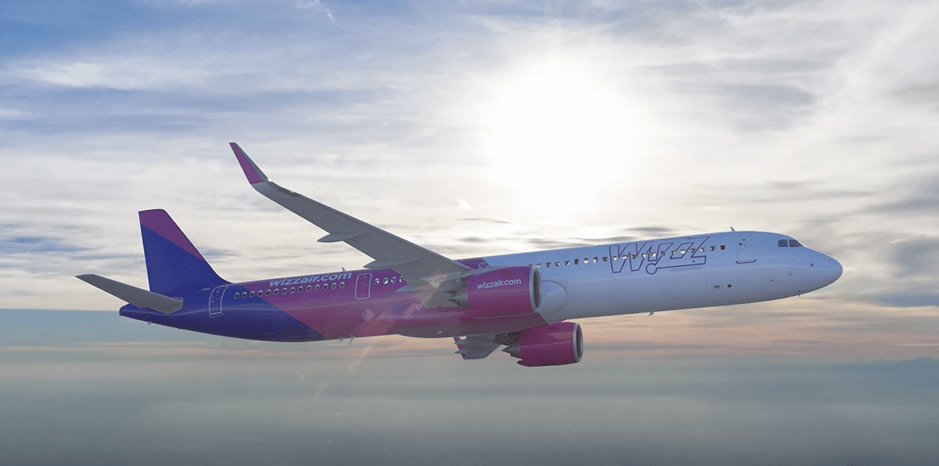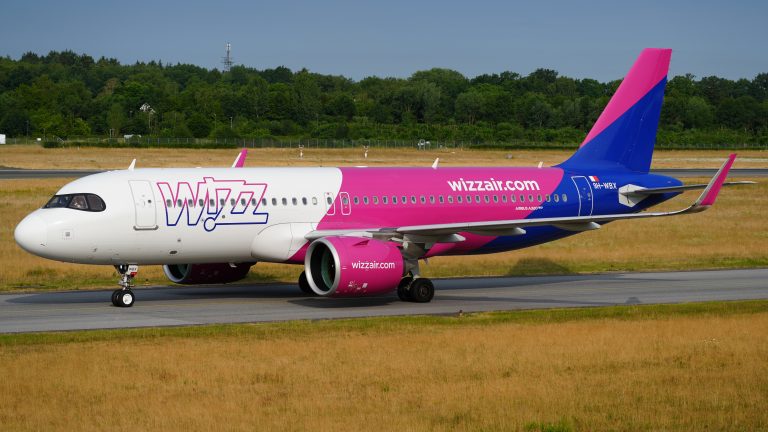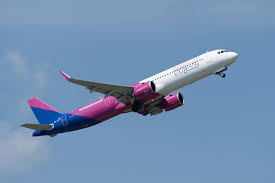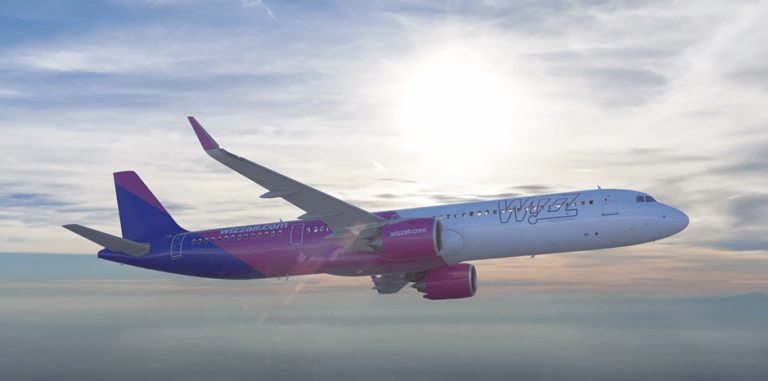Wizz Air Holdings Plc (LON:WIZZ), the largest low-cost airline in Central and Eastern Europe, has issued unaudited results for the three months to 30 June 2020.
| Three months to 30 June | 2020 | 2019 | Change |
| Passengers carried | 707,184 | 10,368,850 | (93.2)% |
| Revenue (€ million) | 90.8 | 691.2 | (86.9)% |
| Underlying EBITDA (€ million) | 8.9 | 187.2 | (95.2)% |
| Underlying EBITDA margin (%) | 9.8 | 27.1 | (17.3)ppts |
| Underlying net profit/loss for the period (€ million)* | (56.7) | 72.4 | n.m. |
| Underlying net profit margin for the period (%) | n.m. | 10.5% | n.m. |
| Statutory net profit for the period (€ million)* | (108.0) | 72.4 | n.m. |
| Statutory net profit margin for the period (%) | n.m. | 10.5% | n.m. |
| Ex-Fuel CASK (€ cent) | 6.81 | 2.27 | 200.2% |
| RASK (€ cent) | 4.36 | 3.84 | 13.6% |
| Total cash (€ million) | 1,587.9 | 1,637.3 | (3.0)% |
| Load factor (%) | 55.5% | 93.7% | (38.2)ppts |
*Q1 FY21 underlying net profit excludes the impact of hedge losses classified as discontinued (amounting to €51.3 million) resulting from the impact of COVID-19 relating to the months of June, July and August 2020 and changes to the months of April and May 2020 which were materially provisioned in Q4F20.
József Váradi, Wizz Air Chief Executive commented on the results:
“Wizz Air maintains strong market and liquidity positions after the first quarter, a period which marks one of the most challenging times in the history of aviation. Due to the Company’s rigorous cost management and focus on maximising returns on flights, the company’s total cash balance stands at c. €1.6bn at the end of the quarter, while net underlying loss for the period was €57 million. We carried 700,000 passengers with a load factor of 56% at a time when European air travel came largely to a halt. Revenue per available seat kilometre increased 14% due to the company’s agile revenue management strategy, as well as an underlying strength in ancillary revenue performance. More importantly, at the end of June, Wizz Air was operating around 70% of its capacity, compared to an average of 11.5% in the first quarter. This gives Wizz Air important operational momentum going into the summer season. I would like to sincerely thank our people who delivered an incredible performance and showed strong resilience during these unprecedented times caused by COVID-19.”
Commenting on business developments and sustainability initiatives, Mr Váradi added:
“During the first quarter, we were focused on ramping up our operations, while protecting the health of our customers and employees. Wizz Air’s most modern fleet as well as our enhanced protective measures are designed to provide the best possible hygienic conditions for passengers.
At the same time, we took advantage of significant market opportunities: Wizz Air re-allocated 22 aircraft across its network and launched more than 200 new routes. We expanded our footprint with new bases in Albania, Cyprus, Italy and Ukraine, as well as Germany, Romania and Russia.
We are especially proud to announce the initial network of Wizz Air Abu Dhabi and reconfirm the start of its operations with two brand new, state-of-the-art Airbus A321neo aircraft from 1st October 2020.
We also launched a pioneering Cabin Crew-to-Captain programme which allows aspiring Wizz Air cabin crew to train as pilots. The programme is aimed at nurturing talent and diversity within the organisation, as well as supporting Wizz Air’s broader commitment to reaching a significant female representation in the flight deck.”
On current trading and the outlook, Mr Váradi said:
“We remain focused on gradually ramping up operations whilst protecting the health of customers and employees. Where needed we will be open to stimulate traffic, while protecting our strong cash position and minimising cost. As the lowest cost producer operating the youngest and most efficient fleet of aircraft, we are best positioned to double down on the opportunities that present themselves and further contribute to the vital mobilisation and recovery of the economy in our markets. I believe Wizz Air will emerge as a structural winner post-COVID-19.”
FINANCIAL RESULTS IN Q1
· Total revenue amounted to €90.8 million:
o Ticket revenues decreased by 92.2% to €29.4 million.
o Ancillary revenues decreased by 80.3% to €61.4 million.
o Total unit revenue increased by 13.6% to 4.36 euro cents per available seat kilometre (ASK).
o Ancillary revenue per passenger increased by 188.6% to €86.8. Excluding the distortion caused by lower passenger numbers and cargo revenue, ancillary revenue per passenger was €47.3 for the quarter. Underlying ancillary revenue performance was strong.
· Total operating expenses (including discontinued fuel hedges) decreased 67.1% to €197.1 million:
o Total unit costs increased 198.1% to 10.11 euro cents per ASK.
o Fuel unit costs increased 193.8% to 3.30 euro cents per ASK, while fuel unit costs excluding the impact of discontinued fuel hedges decreased by 25.7% to 0.83 euro cents per ASK.
o Ex-fuel unit costs increased 200.2% to 6.81 euro cents per ASK.
· The statutory loss for the period was €108.0 million.
· Loss for the period excluding exceptional items amounted to €56.7m.
· Total cash at the end of June 2020 strengthened to €1,587.9 million of which €1,406.0 million was free cash.
SIGNIFICANT EXPANSION
· Significant expansion with the (re-)allocation of 22 aircraft and the launch of more than 200 new routes as follows:
New bases:
‒ Bacău, Romania: two aircraft
‒ Dortmund, Germany: three aircraft
‒ Larnaca, Cyprus: three aircraft
‒ Milan Malpensa, Italy: five aircraft
‒ St. Petersburg, Russia: two aircraft
‒ Lviv, Ukraine: one aircraft
‒ Tirana, Albania: three aircraft
Base expansion:
‒ Belgrade, Serbia: one additional aircraft, taking the base to three aircraft
‒ Varna, Bulgaria: one additional aircraft, taking the base to three aircraft
‒ London Luton, UK: one additional aircraft, taking the base to eleven aircraft
· Network launch of Wizz Air Abu Dhabi, a national airline of the United Arab Emirates, to start operations on 1st October 2020. The airline will base two brand new, state-of-the-art Airbus A321neo aircraft in Abu Dhabi, with an initial network of eleven routes and the allocation of four additional, ultra-modern Airbus A321neo aircraft in the first six months of operation.
· Fleet expansion to 123 aircraft with the addition of the first two A320neo aircraft in the quarter. These game-changing aircraft are powered by Pratt & Whitney GTF engines and deliver close to 50% reduction in noise footprint compared to previous generation aircraft. In addition, Pratt and Whitney’s GTF engine reduces fuel burn by 16% and nitrogen oxide emissions by 50%. Wizz Air’s average aircraft age is 5.5 years, one of the youngest fleets of any major European airline.
SUSTAINABILITY UPDATE
· Wizz Air launched a bespoke “Cabin Crew-to-Captain” initiative, which allows aspiring cabin crew to train as pilots and is aimed at driving gender equality within the industry.
· Wizz Air continuously operates at the lowest CO2 emissions per passenger/km amongst all competitor airlines, with 57.9 grams per passenger/km for the rolling 12 months to 30 June 2020.
CHANGE TO THE MANAGEMENT TEAM
Iain Wetherall will step down from his position as Chief Investment Officer with effect of 15 August 2020 to pursue other opportunities. He joined Wizz Air in July 2011 as Head of Corporate Finance and Investor Relations, following the Company’s initial public offering in 2015, he took on the role of Head of Financial Planning, Controlling and Investor Relations. Mr. Wetherall became the Chief Financial Officer of Wizz Air in August 2017 and moved to the role of Chief Investment Officer in February 2020. He has been instrumental to the success of the Company during a phase of significant growth and we sincerely thank him for his efforts and contributions.
RECENT TRADING AND GUIDANCE
Wizz Air Holdings is on track both in terms of its capacity ramp up plan and its cost savings program and maintains strong operational momentum. The demand environment is largely shaped by various travel restrictions across the Company’s footprint. Due to the ongoing uncertainty caused by COVID-19, the Company is not in a position to provide financial guidance for the financial year 2021 at this point.








































